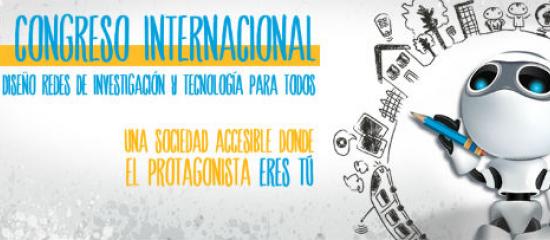DRT4All International Congress extends deadline for paper submission
Monday, 29 April, 2013

The V International Congress DRT4All has extended the call for papers to May 15, 2012. This Congress pretends to be a window to the future. Its main goal is to gather and to disseminate the latest advances in ICT supporting independent living for people with functional limitations, and to demonstrate how these technologies work in order to help persons with disabilities and the elderly lead a better life and achieve a full inclusion in society.
Submissions are requested in the following topics:
Information and Communication Technologies Access Services
- Interfaces and techniques developed to provide access to information about numeric or traditional technologies.
- Technologies designed to provide full access to information to everyone.
- Techniques and technological innovations designed to remove accessibility barriers related to new ICT products and services such as e-books, tablets, IP-TV, among others.
- Specific services addressing social dimension, public and private life, and ethical issues, etc.
- Techniques and technological innovations designed to improve the quality of life, to promote personal independence and to improve employability of people with cognitive or intellectual disabilities.
Human–computer interaction
Proposals leading to more accessible ICT products and services for people with different abilities and preferences are expected. The Conference will focus on innovative methodologies, designs, standardization, multimodality enablers, user adaptability and its contexts, interfaces with minimal cognitive load, developments, evaluation techniques, ICT architecture, metadesign solutions, among others, aimed at improving user experience.
Assistive Technologies
Assistive technologies enable people with functional limitations to perform tasks they cannot accomplish on their own by providing them with enhancements or new methods for interacting with technology. They constitute a complementary approach to Universal Accessibility as they must be compatible with ICT products and services in order to remove barriers in the design of these technologies.
Assistive devices designed to improve employability of people with disabilities in different areas such individual technological training, workplace adaptability or development of technological tools for assistive employment will have a special section.
Telecare
A paradigm shift in social and health models has set forward a gradual transition of primary health care services from hospitals and institutions to home environments. Solutions promoting active aging such as turning homes into spaces for health prevention and active living are becoming increasingly necessary.
Support for independent living can be provided through different means such as electronic assistive technologies, personal monitoring, home alarm management, communication services, and assistive robotics, among others. These services require realistic, comprehensive and accessible organizational and business models where the different interested parties are duly considered.
Digital Homes and independent living
Digital homes are considered accessibility tools which contribute to improve personal autonomy and quality of life by providing access to domestic devices and to external support resources. Smart homes integrate different technological devices such as sensors and actuators, buses and protocols, middleware and multi-agent architectures, gateways, etc. A key requirement is the gradual integration of these services within the digital home, so a methodological framework for designing and assessing human factors characteristics is highly necessary.
Applied robotics for personal autonomy
Personal autonomy progress is closely related to the availability of products and services that compensate certain functional limitations. The evolution robotic based systems, remote control, prosthesis, orthesis, and exoskeletons, etc. is a key factor to the improvement of autonomy and social inclusion of all citizens. In this area new approaches to the development of effective and efficient human-robot interfaces are needed.
Transport for all
Transportation systems are important for the inclusion of all citizens in today’s society. Being able to get to educational centers, working or leisure places using public or private transportation means is essential for the existing city models. So, the availability of technologies, products or services that guarantee equal access and use of transportation is a quality contributing factor.
Accessible collaborative learning technologies
Changes in educational models at all levels, both in mandatory and occupational education, are provoking a radical change in all ICT system designed to provide support to teaching and learning activities. Teachers and students as well as teaching methods, activities and materials are continually adapting to new technologies and digital formats that are frequently changing and evolving. The presence of Universal Accessibility and adaptability concepts in these changes either through technological tools, content format or services is a challenge. Furthermore, collaborative efforts being offered to users through social media or specific collaboration tools are becoming essential features not only for learning technologies but also for society in general, so developing solutions and techniques designed to make social media platforms and collaboration tools accessible are also a priority.
The DRT4All Congress will take place from September 23rd to the 25th in Madrid. Registration will open on May 15th, 2013. For more information, please visit Discapnet website.
Rate this new:
Accessible mobile search assistant
Amóvil helps you identify mobile devices that accommodate your personal preferences. Select your profile.





Leave your comment: